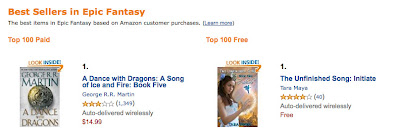20 Things I’ve Learned from Steve Jobs
1. Build stuff that you love, then ask people to buy that stuff so you can keep building more. In 1974, Steve Jobs invited Steve Wozniak to join the Homebrew Computer Club. Woz wanted to keep it a hobby. Jobs convinced Woz to start a company. In 1976, they sold the first fifty Apple I computers.
2. Don’t be afraid to ask for what you want.
At age 13, Steve Jobs called up the head of HP and asked for free computer chips…and got them.
3. Even if you don’t graduate, you can still keep learning. Jobs dropped out of Reed College, but kept auditing classes. (I learned to write BASIC on an Apple II.)
4. If you lose your job, stay focused on what you’ll do next. In 1985, Steve Jobs was fired from Apple, the company he’d help found, and replaced by John Sculley. Jobs promptly founded a new computer company, NeXT. “I didn’t see it then, but it turned out that getting fired from Apple was the best thing that could have ever happened to me. It freed me to enter one of the most creative periods in my life.”
5. Sometimes it takes reaching the bottom before you can soar to infinity and beyond. Steve Jobs turned Pixar from a software company into a movie studio, which produced the first full-length computer-animated feature, “Toy Story,” the first many box office hits. He sold Pixar to Disney in 2006 for $7.4 billion.
6. Even if your ship is sinking, point it in the right direction. In 1997, Jobs returned to Apple as CEO. “I’m actually convinced that if Steve hadn’t come back when he did — if they had waited another six months — Apple would have been history. It would have been gone, absolutely gone.” – John Sculley
7. Don’t be too proud to accept help, even from a former enemy. He turned to long-time rival and founder of Microsoft, Bill Gates, for money to help Apple survive. “We have to let go of this notion that for Apple to win, Microsoft has to lose. We have to embrace a notion that for Apple to win, Apple has to do a really good job.”
8. Don’t be trapped by dogma — which is living with the results of other people’s thinking. Think different.
Rashmi Bansal was so moved by Steve Jobs’ commencement speech she quoted him in the titles of her two books on India’s entrepreneurs.
9. If you find something you like to wear, hey, just go for it.
10. People don’t know what they want until you show it to them.
“That doesn’t mean we don’t listen to customers, but it’s hard for them to tell you what they want when they’ve never seen anything remotely like it. Take desktop video editing. I never got one request from someone who wanted to edit movies on his computer. Yet now that people see it, they say, ‘Oh my God, that’s great!’” Fortune, January 24 2000
“I didn’t know I wanted a portable multimedia platform that would permit me and my kids to hurl angry birds out of a slingshot at thieving pigs. But Steve Jobs did.”
11. Art is as indispensible as science. Fonts matter. (I wrote all the Unfinished Song novels on successive iBooks.)
12. Focus doesn’t mean just mean saying yes to the thing you’ve got to focus on. It means saying no to the hundred other good ideas that there are.
“Apple is a $30 billion company, yet we’ve got less than 30 major products.”
13. Staff your stores with geniuses.
There are now over 300 Apple stores world wide. They have the highest revenue per square foot of any stores in the world. 14. For you to sleep well at night, quality has to be carried all the way through.
The first server node on the World Wide Web was a NeXT box.
I used a Mac to email my mother from the other side of the world on Sep. 11, 2001.
15. Simple can be harder than complex. The first Game of Life was designed for the Apple I.
16. Stay hungry, stay foolish.
Steve Jobs was one 1% richest people on Earth. But he stayed hungry until the last day of his life.
17. Creativity is just connecting things.
The iTunes Store opened in 2003. By 2007, Apple was selling 5 million songs a day.
In 2007, the Apple iPhone, became the most popular phone in history.
18. Wealth is just connecting people.
App Store has sold over 10 Billion Apps.
(My books can now be bought in the Apple bookstore.)
19. Don’t rest on your past accomplishments. When you reach the top of your industry, start a new industry. Then do it again.
Apple II, Macintosh, Pixar, iPod, iPhone, iPad, Apple TV, iBooks, Apple App Store, iCloud…
20. Death is very likely the single best invention of life. It’s life’s change agent; it clears out the old to make way for the new. Your time is limited, so don’t waste it living someone else’s life.
Thank you, Steve Jobs, for changing the world and leaving it a better place.
This video was made on iMovie.

